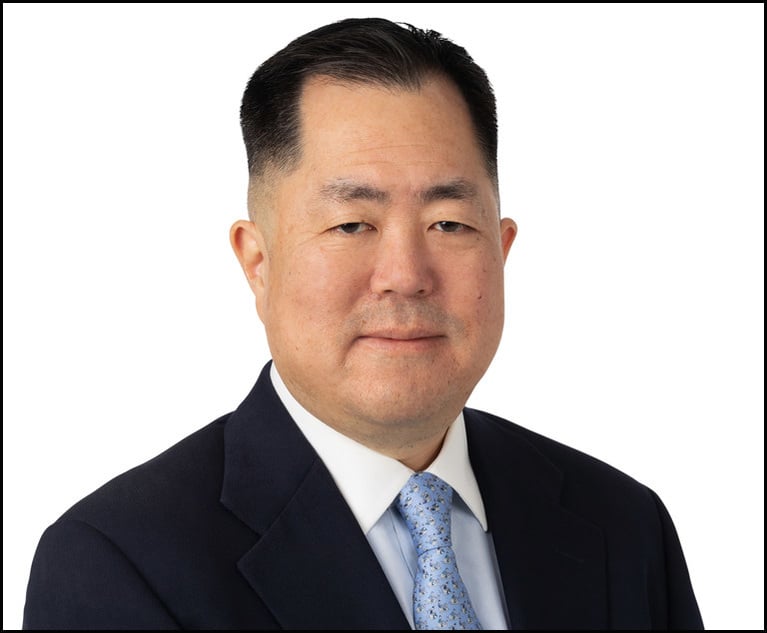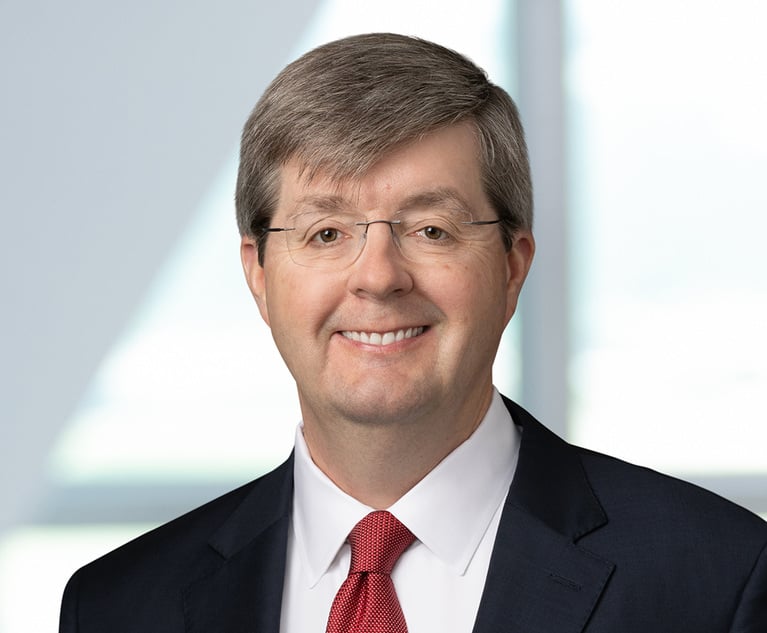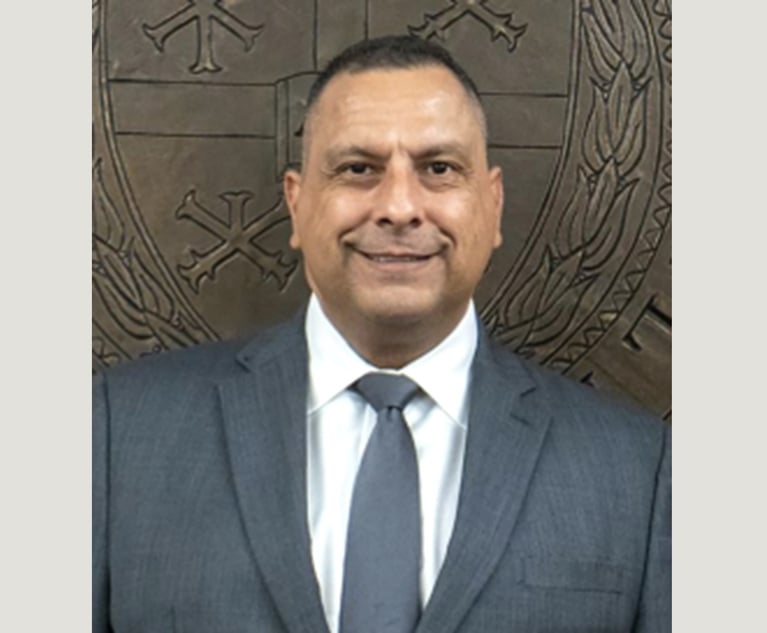 Frederick Nance, Cleveland-based regional managing partner at Squire Patton Boggs.
Frederick Nance, Cleveland-based regional managing partner at Squire Patton Boggs.Q&A: LeBron's Longtime Attorney Talks About More Than a Vote Initiative, Working With King James and Racial Equality
Frederick Nance has been James' attorneys since James was a teenager. He says James' voter suppression counter is poised for big things at just the right time.
June 25, 2020 at 04:08 PM
8 minute read
Frederick (Fred) Nance, the global managing partner for the U.S. LLC of Squire Patton Boggs (which in Squire parlance puts him in charge of not just the 16 U.S. offices, but Asia, the Middle East, Latin America and Eastern Europe as well) who works out of the Akron, Ohio, area, has been working with former Cavaliers/Heat star and current Laker LeBron James since James was 17 years old.
In that time, Nance has watched the evolution of a teenage basketball phenomenon who has turned into a powerful businessman and socially influential public figure.
The most recent iteration of that evolution comes in the form of Nance and his team at Squire working with James' new More Than a Vote program, which aims to combat voter suppression in the 2020 election cycle.
The initiative is partnering with various voter and civil rights organizations such as When We All Vote, the Lawyers' Committee for Civil Rights Under Law's Election Protection Coalition and Fair Fight Action in order to ensure that all Americans, and especially Black voters who are often the target of voter suppression efforts, have the access and information they need to cast a ballot in November.
The American Lawyer caught up with Nance to discuss his work on the MTAV project, how he came to work with James, and what he thinks of the remarkable and unprecedented support for racial equality that is currently embracing the United States.
The following interview has been lightly edited for brevity.
How did you begin working with James, and what sort of work have you done for him over the years?
I have had not only the privilege, but the career-altering opportunity to represent him since high school. The document regarding us representing him was signed by his mother in 2002 when he was 17. The process of seeing this young man go from being a basketball phenomenon, filling college stadiums and having his games nationally televised in high school to now has been amazing. He also came up under extremely impoverished circumstances. His mom moved seven or eight times, and he grew up under challenging circumstances. Imagine taking someone from that background who is now under the national spotlight. They were living in public housing, and then a year later he had $90 million in contracts. He went from that world to having virtually unlimited resources and unlimited scrutiny. The opportunity for him to crash and burn was there. The internet and social media had really started to pick up. It coincided with him becoming a professional, and add to that the competition from the shoe companies like Adidas, Nike and Reebok to sign him to endorsement deals, and it's tough.
One of my jobs initially, other than putting structure to the business relationships, was to protect him from predators. When you have people who don't have business as a part of their background and don't have relationships with people who would be savvy in business matters, it can get difficult. It was a critical role for a lawyer to play.
How did you and Squire end up working with James on the More Than a Vote project?
Uninterrupted, the digital media platform that he and his best friend and business partner Maverick Carter set up a few years ago, was designed to be an outlet for pro athletes to speak their minds without a media intermediary. Jennifer Lewis was the new general counsel at Uninterrupted. She came to us at the beginning of February by virtue of the fact that we had represented LeBron in his businesses and a variety of other matters. She came to us first, but we weren't the only ones. She told us about the plan to set up MTAV, about the concept.
There are of course a panoply of legal issues associated with it. We made a pitch as to how we would address them, what the resources are that we would bring to the table. She hired us to get that process going. When I say a myriad of issues, I mean issues around election law, privacy law, IP issues with regard to fair use and image rights from videos, and more. There are tax issues with setting up a not-for-profit. These issues evolved as they settled in on what they wanted to do. Just given the circumstance of what has been unfolding, we decided to do the MTAV pro bono [the firm is still doing paid work for Uninterrupted].
One of the things I was also happy to be involved in was connecting MTAV with more traditional election protection efforts, a notable one being the Lawyers Committee for Civil Rights Under Law, which has been around for a long time. It has the most elaborate election protection initiative, including a significant litigation docket challenging measures that impede voting rights. MTAV is also partnering with Michelle Obama's When We All Vote, which is a very effective electronic voter registration tool.
At this point there are over two dozen other pro athletes and entertainers who have signed on to this, and it is only going to grow.
Are we seeing a tipping point in the United States in how people view racial equality?
I can't say it is a tipping point, but it is an inflection point, which seemingly came out of nowhere. I have been practicing for decades, and have never seen the level of awareness, of sensitivity, of the desire of a broad population of the U.S. to attempt to understand the life experience of African Americans, the impact of not just decades or lifetimes but literally hundreds of years of exploitation that started out as a horrific crime against humanity.
Until this year, most Americans had not heard of Juneteenth, or the Tulsa massacre, as it isn't taught in schools. There is a great irony in all of this. My white friends feel so emotional that they had not fully appreciated the impact of all of this and are feeling as though we have been ignoring something that has been right in our face.
As an African American I feel optimistic. Never has there been this empathy in my lifetime. A majority of Americans believe that there is something fundamentally wrong with our justice and policing systems that disproportionately affect African Americans, and people lose their lives.
We have been communicating at Squire and with other firms. It has been a real eye-opener, sometimes an emotional one, to have people share their experiences. One of our colleagues shared that it is common knowledge in the D.C./Maryland/Virginia (DMV) area that if you are Black and live in an affluent community and you know the police are going to come, you can't send a male to answer the door. They assume he is the perpetrator.
Another example is those of us who are African American and successful in law firms mentor younger African American lawyers. Among the advice I have given them for years is that if you are easily offended or get upset at what could be perceived as a slight, or if you are going to bothered by a situation where one of your white peers got an opportunity that you haven't had yet … if that makes it hard of you, you should look for another job.
|Read More:
Associate Spotlight: From Chickasaw Nation in Oklahoma to Big Law in California
To Improve D&I Efforts, 'Admitting Shortcomings' is Key, Bressler's New Diversity Chair Says
Over 125 Firms Have Joined the Law Firm Antiracism Alliance
This content has been archived. It is available through our partners, LexisNexis® and Bloomberg Law.
To view this content, please continue to their sites.
Not a Lexis Subscriber?
Subscribe Now
Not a Bloomberg Law Subscriber?
Subscribe Now
NOT FOR REPRINT
© 2025 ALM Global, LLC, All Rights Reserved. Request academic re-use from www.copyright.com. All other uses, submit a request to [email protected]. For more information visit Asset & Logo Licensing.
You Might Like
View All
Husch Blackwell Hires Former Adobe Counsel to Oversee AI Advisory Offering
3 minute read
'Taking the Best' of Both Firms, Ballard Spahr and Lane Powell Officially Merge
6 minute read
Bracewell Adds Former Pioneer Natural Resources Lawyer to O&G, Energy Transition Practices
2 minute read
Law Firms Mentioned
Trending Stories
Who Got The Work
Michael G. Bongiorno, Andrew Scott Dulberg and Elizabeth E. Driscoll from Wilmer Cutler Pickering Hale and Dorr have stepped in to represent Symbotic Inc., an A.I.-enabled technology platform that focuses on increasing supply chain efficiency, and other defendants in a pending shareholder derivative lawsuit. The case, filed Oct. 2 in Massachusetts District Court by the Brown Law Firm on behalf of Stephen Austen, accuses certain officers and directors of misleading investors in regard to Symbotic's potential for margin growth by failing to disclose that the company was not equipped to timely deploy its systems or manage expenses through project delays. The case, assigned to U.S. District Judge Nathaniel M. Gorton, is 1:24-cv-12522, Austen v. Cohen et al.
Who Got The Work
Edmund Polubinski and Marie Killmond of Davis Polk & Wardwell have entered appearances for data platform software development company MongoDB and other defendants in a pending shareholder derivative lawsuit. The action, filed Oct. 7 in New York Southern District Court by the Brown Law Firm, accuses the company's directors and/or officers of falsely expressing confidence in the company’s restructuring of its sales incentive plan and downplaying the severity of decreases in its upfront commitments. The case is 1:24-cv-07594, Roy v. Ittycheria et al.
Who Got The Work
Amy O. Bruchs and Kurt F. Ellison of Michael Best & Friedrich have entered appearances for Epic Systems Corp. in a pending employment discrimination lawsuit. The suit was filed Sept. 7 in Wisconsin Western District Court by Levine Eisberner LLC and Siri & Glimstad on behalf of a project manager who claims that he was wrongfully terminated after applying for a religious exemption to the defendant's COVID-19 vaccine mandate. The case, assigned to U.S. Magistrate Judge Anita Marie Boor, is 3:24-cv-00630, Secker, Nathan v. Epic Systems Corporation.
Who Got The Work
David X. Sullivan, Thomas J. Finn and Gregory A. Hall from McCarter & English have entered appearances for Sunrun Installation Services in a pending civil rights lawsuit. The complaint was filed Sept. 4 in Connecticut District Court by attorney Robert M. Berke on behalf of former employee George Edward Steins, who was arrested and charged with employing an unregistered home improvement salesperson. The complaint alleges that had Sunrun informed the Connecticut Department of Consumer Protection that the plaintiff's employment had ended in 2017 and that he no longer held Sunrun's home improvement contractor license, he would not have been hit with charges, which were dismissed in May 2024. The case, assigned to U.S. District Judge Jeffrey A. Meyer, is 3:24-cv-01423, Steins v. Sunrun, Inc. et al.
Who Got The Work
Greenberg Traurig shareholder Joshua L. Raskin has entered an appearance for boohoo.com UK Ltd. in a pending patent infringement lawsuit. The suit, filed Sept. 3 in Texas Eastern District Court by Rozier Hardt McDonough on behalf of Alto Dynamics, asserts five patents related to an online shopping platform. The case, assigned to U.S. District Judge Rodney Gilstrap, is 2:24-cv-00719, Alto Dynamics, LLC v. boohoo.com UK Limited.
Featured Firms
Law Offices of Gary Martin Hays & Associates, P.C.
(470) 294-1674
Law Offices of Mark E. Salomone
(857) 444-6468
Smith & Hassler
(713) 739-1250









